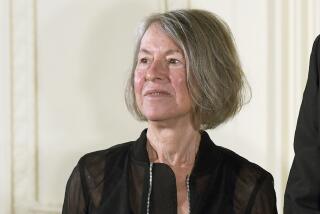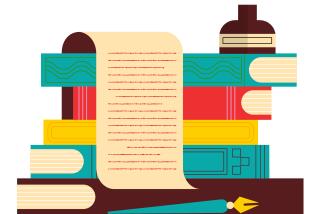‘Paris Was a Woman’--and a Haven
- Share via
At the beginning of her elegant and illuminating “Paris Was a Woman,” documentarian Greta Schiller declares that in the first quarter of the 20th century, the Left Bank of the City of Lights was a magnet for women from all over America and Europe, with its “promise of freedom,” of “a life filled with literature and art.” Schiller goes a long way toward balancing the image of Paris between the wars as a male paradise for the likes of Hemingway and Fitzgerald.
Starting with Gertrude Stein, whose experimental writing influenced Hemingway, and her lover Alice B. Toklas, virtually all of the key figures in Schiller’s film were lesbians, yet Schiller and her writer Andrea Weiss acknowledge this with a reticence bordering on reluctance. Surely, since virtually all of them did become famous in literature and art, some exploration of the connection between their sexual orientation and their creativity could be significant. But the film does not go much beyond remarking that with them, “the Muse took human form.”
Schiller, however, is nonetheless invaluable for giving us an idea of what these women were like and why they remain important. We’re told that between 1906-09 only Stein and her brothers purchased Picasso’s paintings, that the Steins in effect created the world’s first collection of modern art and that Stein and Picasso were kindred spirits. We learn from Janet Flanner, who was the New Yorker’s peerless Paris correspondent for nearly half a century under the pen name Ge^net, that Toklas was Stein’s muse, enabler and cook--and also that “Alice had malice.” (Apparently, Toklas was not above quipping about Stein picking up young women in the basement restroom of the Galeries Lafayette!)
*
Given equal importance with Stein and Toklas are booksellers Adrienne Monnier and Sylvia Beach. Schiller credits Monnier with establishing the lending library concept in France and with encouraging Beach, an American who became her employee and subsequent lover, with establishing her own nearby bookstore, the famous Shakespeare and Company, which became a literary haven for decades. Beach is well-remembered for publishing the widely banned “Ulysses,” only to have James Joyce eventually break his contract with her, leaving her facing bankruptcy. Also key are American heiress Nathalie Barney, who for several generations ran a celebrated salon, and her lover of 62 years, painter Romaine Brooks. A less happy relationship was between writer-journalist extraordinaire Djuna Barnes and alcoholic artist Thelma Wood.
In regard to Barney, Schiller was fortunate that she was able to interview Barney’s longtime housekeeper, Berthe Cleyrergue, a woman of wit and perception who helps suggest how supportive all these women and others could be of one another despite the natural occasional clashes and differences in temperament. One of the few survivors of this group is noted photographer Gisele Freund, who comments incisively on her friends and colleagues. The modest Beach and the astringent Flanner both lived long enough to give TV interviews from which Schiller could select key sequences. Stills, first-rate archival footage and recordings of Monnier, Toklas and Stein round out the richness of “Paris Was a Woman.”
* Unrated. Times guidelines: The film tells of the lives of some women famous in arts and letters, most of whom happened to be lesbians.
‘Paris Was a Woman’
A Zeitgeist Film release of a co-production of Jezebel Productions and Cicada Film. Director-editor Greta Schiller. Producers Frances Berrigan, Schiller, Andrea Weiss. Executive producer Berrigan. Writer Weiss. Cinematographers Nurtish Aviv, Schiller, Renato Tonelli, Fawn Yacker. Music Janette Mason. Running time: 1 hour, 15 minutes.
* Exclusively at the Nuart through Wednesday, 11272 Santa Monica Blvd., West Los Angeles, (310) 478-6379. (The film is playing concurrently with “Screwed,” but separate admissions are required.)
More to Read
Sign up for our Book Club newsletter
Get the latest news, events and more from the Los Angeles Times Book Club, and help us get L.A. reading and talking.
You may occasionally receive promotional content from the Los Angeles Times.







